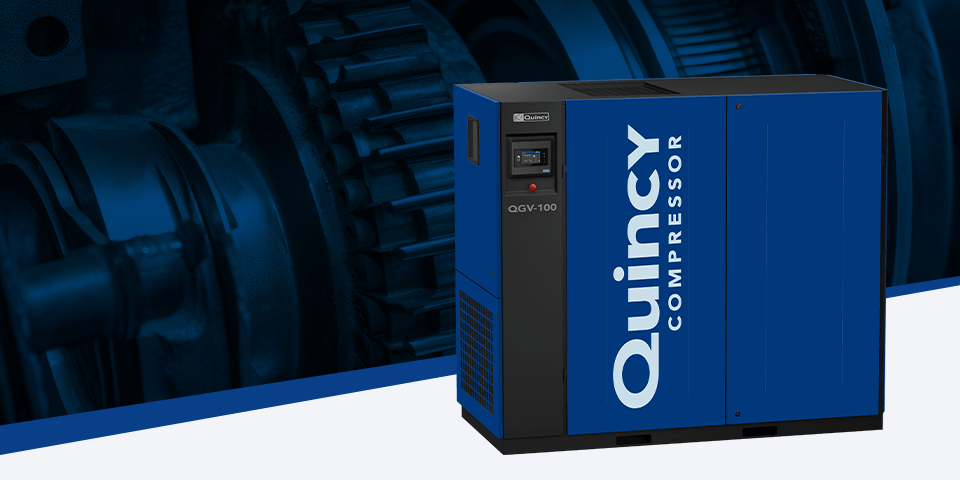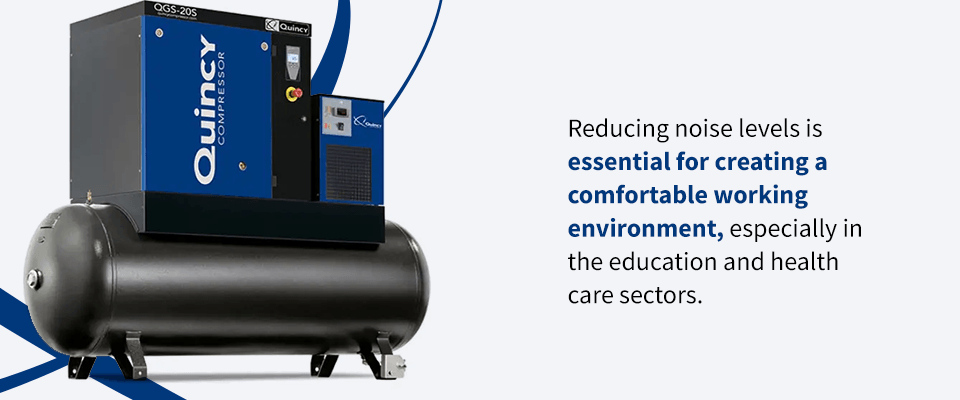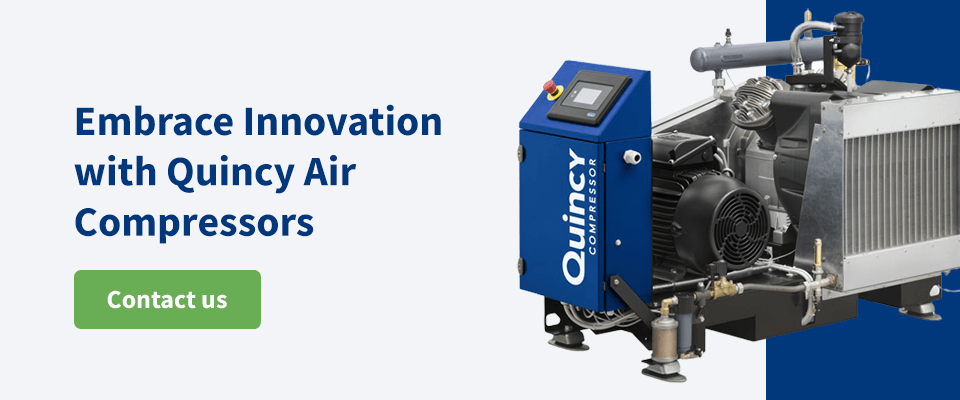
As environmental concerns continue dominating the marketplace, industries worldwide seek ways to become more sustainable. The industrial air compressor market is no exception. The global air compressor market size was valued at $16.51 billion in 2022 and is projected to grow from 17.22 billion in 2023 to 25.6 billion in 2030 at a compound annual growth rate (CAGR) of 5.8% over the next seven years.
Air compressor design is changing to accommodate various energy efficiency and sustainability goals. Besides streamlining their design, they can play a vital role in green sectors, facilitating alternative energy generation.
Current Trends in the Air Compressor Industry
Compressed air systems are a vital tool in many industries. The latest innovations are poised to change the efficiency and sustainability of air compressors for years. Integrating cutting-edge equipment with existing systems drives that change. Innovation and technological advances in the air compressor space are poised to elevate the environment of tomorrow.
Some of the emerging trends in the air compressor industry include:
1. Improved Efficiency
Air compressor efficiency is vital for several reasons. Manufacturers have made significant strides in reducing costs, increasing system longevity and lowering emissions. Focusing on compressor efficiency forms part of a broad sustainability strategy. Efficient air compressors can result in energy cost savings of over $30,000 and reduce CO2 output by around 269 metric tons with a 200-hp air compressor. They save money and reduce pollution.
Advancements in compressor technology have allowed for significantly more energy-efficient systems. Variable-speed drive compressors are an excellent example of the current energy-efficient technology. These units are designed to vary motor speed based on compressed air requirements, resulting in considerable energy savings. Manufacturers are producing air compressors for many industries with efficiency in mind. Some models can reduce energy consumption by up to 50%, making them ideal options for organizations looking to reduce operating costs and meet sustainability objectives.
2. Design Innovations
Modern air compressor design leverages newer materials and manufacturing procedures. The aim is to improve machine performance and reliability—for example, the shift to lubricant-free compressors for industries that require clean air. The Compressed Air and Gas Institute’s performance verification program allows users to compare equipment and make educated efficiency choices. This third-party testing program aims to validate manufacturer claims about air compressor performance, encouraging manufacturers to improve.
3. Quieter Operations
Traditional air compressor motors create considerable sound. Noise reduction technology is a top industry priority. Manufacturers are designing new models to minimize vibrations and noise levels without impacting performance.
Reducing noise levels is essential for creating a comfortable working environment, especially in the education and health care sectors. Manufacturers balance performance and comfort to reduce noise pollution and make air compressors suitable for a broader range of applications.
4. Enhanced System Monitoring
Communication, industrial instrumentation, data collection and storage innovations have transformed compressed air system monitoring. The trend toward continuous monitoring continues, ensuring compressed air systems run efficiently in the long term. Consistent monitoring almost always identifies saving opportunities, even small measures like reducing operating pressure and switching compressors off after use.
Monitoring systems keep users aware of system efficiency, allowing them to compare it to a target number and address efficiency challenges.
5. Demand-Side Reduction
Although much of the focus is on energy reduction in air compressors, many users and suppliers are paying attention to the demand side of compressed air systems. Some of the biggest savings can come from reducing compressed air demand. Educating users on the amount of wasted compressed air through lack of maintenance and inappropriate use is essential.
Leak detection systems are one of many evolving technologies to boost demand-side reduction. Leak detectors equipped with technology like integrated cameras and software solutions to streamline reporting are already available. Many more are likely to emerge.
6. Sustainability
The demand for sustainable air compressors is growing. In response, manufacturers continue to innovate and develop green alternatives. These compressors are designed to reduce carbon emissions and conserve energy, minimizing negative environmental impacts.
Energy consumption is one principal area of focus. Traditional air compressors can be significant energy consumers, and manufacturers and users are integrating advanced technology to reduce this consumption.
The Role of Air Compressors in Renewable Energy Systems
Aside from internal adjustments in the air compressor industry to minimize environmental impact and maximize energy efficiency. Many businesses are considering the energy-efficient compressor vs. inverter debate for green sectors. Compressed air systems are often more efficient than other forms of alternative energy generation. They can play a critical role in the context of renewable energy systems, including:
- Wind turbines: Air compressors are essential for operating and maintaining wind turbines. They provide the compressed air necessary for their hydraulic systems, cooling and cleaning turbine components, streamlining performance and boosting equipment longevity.
- Solar energy: Solar panels are critical in the renewable energy sector and require consistent cleaning and maintenance to enhance efficiency. Air compressors are an effective tool in removing dust and debris from solar panel systems.
- Energy storage: Compressed air energy storage (CAES) technology has continued to evolve. These systems store energy underground at extremely high pressure using natural gas or other fossil fuels as a power source. Turbines produce energy from the compressed air when needed. The high cost of this technology has prevented widespread adoption in the past. As solar and wind prices drop, CAES could eliminate our reliance on traditional energy generation.
- Hybrid car engines: The growing interest in improving automotive engine systems through oil-free technology and advanced engine designs encourages manufacturers to explore new avenues for improving engine performance. For example, air engines use compressed air as a power source.
- Medical and culinary systems: Compressed air in industries requiring clean air is becoming critical. Reducing greenhouse gas emissions in health care and food applications requires a power source that won’t contaminate their environments. As air compressor technology evolves, the demand for sustainably sourced compressed air will continue to climb.
Industrial Air Compressor Future Trends
The future is green. Past and present innovations have already created efficient air compressor options, and manufacturers are looking ahead to future advancements. As we continue to focus on energy-efficient alternatives, there’s much potential for further change, including:
- Digital control systems: Digital innovations can increase compressor operation precision and control. They can monitor and adjust pressure levels in real time, increasing longevity and improving the overall energy efficiency of an operation.
- Alternative materials: Sustainability and energy efficiency impact every industry, and component manufacturers seek methods to improve their operations. Advances in material science will continue to reveal durable components, increasing compressor longevity and reducing downtime.
- Compact designs: Smaller designs are user-friendly, and manufacturers constantly seek methods of creating smaller, flexible designs without impacting performance. Air compressors will become available to users with limited space and unique requirements.
Embrace Innovation with Quincy Air Compressors
The evolution in air compressor technology has been long and complex. Reliability and performance remain the primary focus for users. Aligning these elements with practical energy-efficient technology is essential to maintain a competitive edge and meet sustainability goals.
Quincy has delivered uncompromising air compressor reliability and performance since 1920. We have remained at the forefront of innovation, creating energy-efficient air compressors and helping our customers integrate energy-efficient machinery. Feel free to reach out and learn more about how our high-performance products can transform your operations today!



